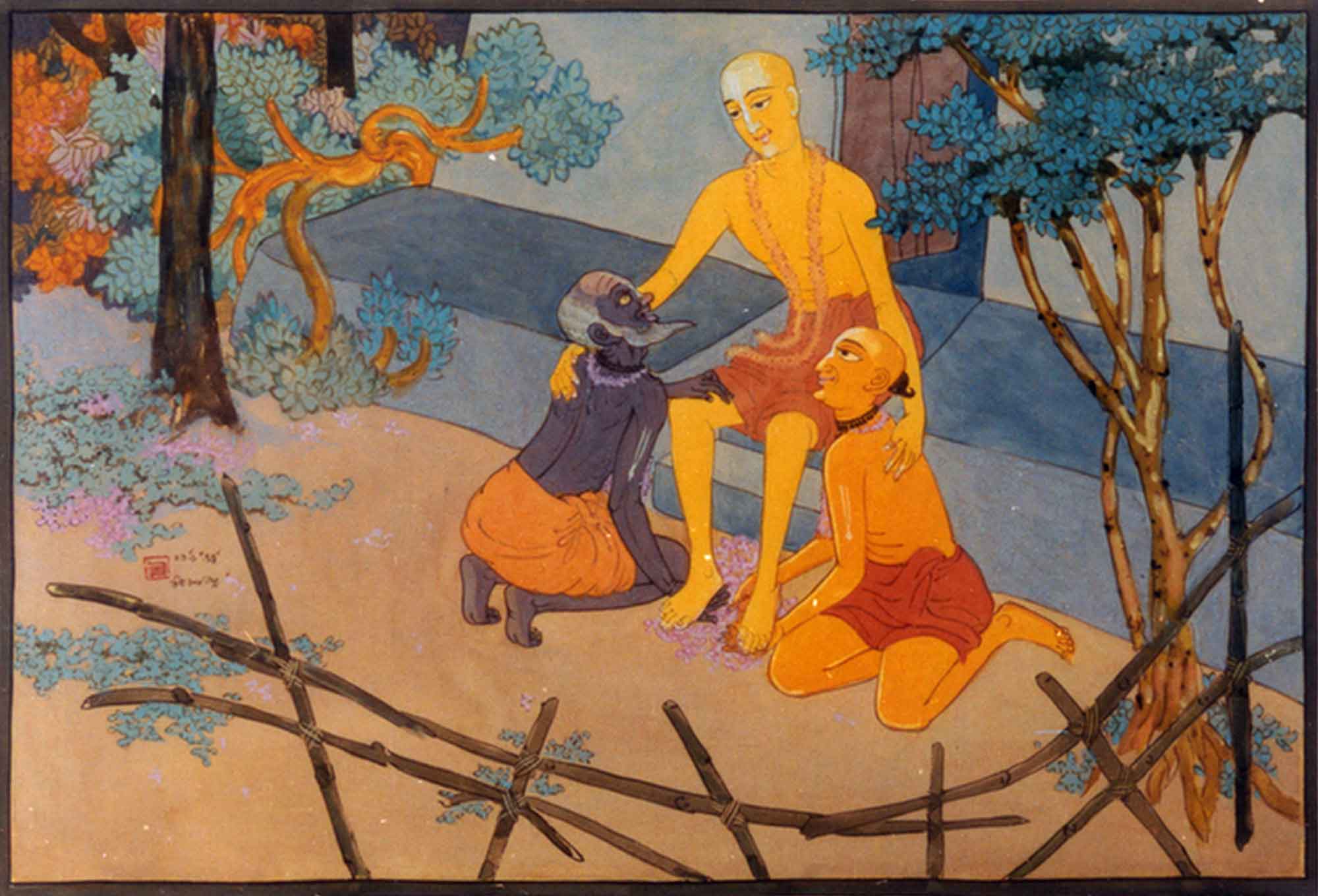Overview
This article "Niyamāgraha (Attachment or neglect of rules and regulations)" is the fourth in a series of articles published in the 10th Volume of Sajjana Toṣaṇī which deals with the six things that are favourable to bhakti and the six things that are unfavourable according to the second and third verses of Śrīla Rūpa Gosvāmī’s Upadeśāmṛta. This fourth article deals with Niyamagraha – Attachment or neglect of rules and regulations - Bhaktivinoda Ṭhākura explains that unnecessary attachment to scriptural rules and also the rejection of scriptural rules at the lower stage of sādhana-bhakti is dangerous.
(translated by Bhumipati Dasa)
Listen to this article:
Niyamas, or rules, are of two kinds – vidhis, or prescriptions, and niṣedhas, or prohibitions. Whatever is enjoined as one’s duty is a prescribed rule. Whatever is enjoined as restricted is a prohibited rule. Both kinds of rules are auspicious for the living entities.
Conditioned souls are eligible to attain a very exalted position from a very low position. Between these two positions there are many other positions. Each position is a gradual step. Each gradual step is a distinct level of advancement. Each and every gradual step has different prescriptions and prohibitions. Whenever a living entity steps to one level and stays there, he is obliged to follow the prescriptions and prohibitions of that step. By following those enjoined prescriptions and prohibitions, one becomes eligible to attain the next step. If one is unable to attain the next step, he falls down to a lower step. This is called degradation. Attaining the higher step is called advancement.
To properly follow the precepts of one’s own level is called “one’s prescribed duties” or steadiness in one’s own position. Steadiness in one’s own position is piety, and deviation from one’s position is impiety. There is no other piety and impiety than this. Therefore, in the Śrīmad-Bhāgavatam (11.21.2-7) Lord Kṛṣṇa spoke these instructions to Uddhava:
sve sve ‘dhikāre yā niṣṭhā
sa guṇaḥ parikīrtitaḥ
viparyayas tu doṣaḥ syād
ubhayor eṣa niścayaḥ
deśa-kālādi-bhāvānāṁ
vastūnāṁ mama sattama
guṇa-doṣau vidhīyete
niyamārthaṁ hi karmaṇām
“Steadiness in one’s own position is declared to be actual piety, whereas deviation from one’s position is considered impiety. In this way the two are definitely ascertained. O saintly Uddhava, in order to restrict materialistic activities, I have established that which is proper and improper among all material things, including time, space and all physical objects.”
Prescribed and prohibited rules are further divided into two categories—conditional and constitutional. The living entity is pure spirit. The prescriptions and prohibitions in the living entity’s constitutional position are constitutional rules. But when the living entity is separated from his transcendental position, he accepts the designations given by the illusory energy and is entangled in this world—these are false designations. These designations are of many varieties, but the constitutional situation is one without second.
In the eternal state of the living entity, prema is the only prescription and envy is the only prohibition. This prescription and prohibition is subordinate to the living entity’s eternal nature. The living entity imbued with prema and devoid of envy is the shelter of eternal rasa. Although rasa is of five varieties, still they are one undivided spiritual truth. The rules of that position are not to be discussed here. We must know only that this state is the eternal condition of the living entity.
Although in the conditional state the rules are of different types, still all the steps are divided into three principle categories. According to the Vedas, Bhagavad-gītā, and all the smṛtis, three principle divisions are found-karma, jñāna, and bhakti. In each division certain prescriptions and certain prohibitions are enjoined. In the karma division, the rules of varṇāśrama and the ten supplementary saṁskāras as well as regulative prayers are prescribed. Sins and bad habits are prohibited. In the jñāna division, sannyāsa, renunciation, detachment, and discussing matter and spirit are prescribed. Fruitive activities, forbidden activities, and attachment to sense enjoyment are prohibited. In the bhakti division, indifference, performance of activities favorable to devotion, following the prescriptions and prohibitions of the jñāna division, and cultivating devotional service with the help of those prescriptions and prohibitions are prescribed. All activities opposed to the Lord, jñāna, renunciation, attachment to sense enjoyment, conclusions opposed to devotional service, and giving up action are prohibited.
When the conditioned soul advances by giving up his illicit activities, or low-class character, then he attains the level of karma-kaṇḍa. Such a person should remain in varṇāśrama-dharma and aspire to attain the level of jñāna. This is his duty. He should remain in varṇāśrama until he attains detachment from material activities by discussing the difference between matter and spirit and analyzing the nature of false ego, otherwise he becomes sinful. When that detachment is attained, then his higher qualification destroys his attachment to fruitive activities. But if that person still remains inclined to the rules of karma-kaṇḍa, then he cannot make advancement.
The duty of one who has attained the level of jñāna-kaṇḍa is to remain fixed in knowledge. Until he attains a taste for devotional service, he should remain under the rules of jñāna-kaṇḍa. As soon as the qualification for devotional service manifests, he should give up his attachment for jñāna-kaṇḍa, otherwise he is guilty of niyamāgraha and will not make advancement. As stated in the Śrīmad-Bhāgavatam (11.20.9):
tāvat karmāṇi kurvīta
na nirvidyeta yāvatā
mat-kathā-śravaṇādau vā
śraddhā yāvan na jāyate
“As long as one is not satiated by fruitive activity and has not awakened his taste for devotional service by śravaṇaṁ kīrtanaṁ viṣṇoḥ one has to act according to the regulative principles of the Vedic injunctions.”
Śraddhā, or faith, is the only qualification for bhakti. As stated in the Śrīmad-Bhāgavatam (11.20.31):
tasmān mad-bhakti-yuktasya
yogino vai mad-ātmanaḥ
na jñānaṁ na ca vairāgyaṁ
prāyaḥ śreyo bhaved iha
“Therefore, for a devotee engaged in My loving service, with mind fixed on Me, the cultivation of knowledge and renunciation is generally not the means of achieving the highest perfection within this world.”
The temple of kṛṣṇa-prema is situated on the highest peak of Goloka Vṛndāvana. In order to reach that peak one has to cross the fourteen planetary systems of karma-kaṇḍa, the Virajā-Brahmaloka of the jñāna-kaṇḍa, and then rise above Vaikuṇṭha. By gradually giving up attachment to the stages of karma and jñāna, one becomes eligible for bhakti. After crossing the various stages of bhakti, one reaches the temple door of prema.
Śraddhā is the only rule for people established on the level of bhakti. As anarthas, or unwanted habits, are destroyed by the power of devotional service performed under the shelter of sādhu and guru, that śraddhā transforms into devotional service with niṣṭha, or firm faith. As the anarthas are further destroyed, one progresses from the level of niṣṭha to ruci, or taste; from ruci to āsakti, or attachment; and from āsakti to bhāva, or emotion. When bhāva, in the form of rati, or affection, is mixed with the appropriate ingredients, it becomes rasa. In the Śrīmad-Bhāgavatam (11.14.26) it is said:
yathā yathātmā parimṛjyate ‘sau
mat-puṇya-gāthā-śravaṇābhidhānaiḥ
tathā tathā paśyati vastu sūkṣmaṁ
cakṣur yathaivāñjana-samprayuktam
“When a diseased eye is treated with medicinal ointment it gradually recovers its power to see. Similarly, as a conscious living entity cleanses himself of material contamination by hearing and chanting the pious narrations of My glories, he regains his ability to see Me, the Absolute Truth, in My subtle spiritual form.”
Śrīla Rūpa Gosvāmī clarifies the sequence in his Bhakti-rasāmṛta-sindhu as follows:
ādau śraddhā tataḥ sādhu-
saṅgo ‘tha bhajana-kriyā
tato ‘nartha-nivṛttiḥ syāt
tato niṣṭhā rucis tataḥ
athāsaktis tato bhāvas
tataḥ premābhyudañcati
sādhakānām ayaṁ premṇaḥ
prādurbhāve bhavet kramaḥ
“In the beginning one must have a preliminary desire for self-realization. This will bring one to the stage of trying to associate with persons who are spiritually elevated. In the next stage one becomes initiated by an elevated spiritual master, and under his instruction the neophyte devotee begins the process of devotional service. By execution of devotional service under the guidance of the spiritual master, one becomes free from all material attachment, attains steadiness in self-realization, and acquires a taste for hearing about the Absolute Personality of Godhead, Śrī Kṛṣṇa. This taste leads one further forward to attachment for Kṛṣṇa consciousness, which is matured in bhāva, or the preliminary stage of transcendental love of God. Real love for God is called prema, the highest perfectional stage of life.”
In the process of sādhana-bhakti there are four stages—śraddhā, niṣṭhā, ruci, and āsakti. After passing these four stages one comes to the level of bhāva, which is the doorstep of prema. According to the degree of faith, each level has different rules. As one leaves behind one level and progresses to the next, he should honour the rules of the latter and leave aside those of the former. Those who do not give up the rules of the previous level are bound by those rules like chains that do not allow him to proceed to the next level.
In the process of devotional service, whatever rules are prescribed for each level are all subordinate to one principle rule. That general rule is given in the Padma Purāṇa as follows:
smartavyaḥ satataṁ viṣṇur
vismartavyo na jātucit
sarve vidhi-niṣedhāḥ syur
etayor eva kiṅkarāḥ
Remembering Kṛṣṇa is the eternal duty. All other prescriptions mentioned in the śāstras have arisen from this main prescription. Forgetting Kṛṣṇa is never allowed. All other prohibitions mentioned in the śāstras have arisen from this main prohibition. Keeping this main prescription in mind while advancing, the practitioner should give up his attachment for the prescriptions of the previous level and accept the prescriptions of the next level. Otherwise he will be guilty of niyamāgraha and weak in reaching the next level. The practitioner of devotional service must always remember this point. In the conclusion of Hari-bhakti-vilāsa a special instruction is given in this regard:
kṛtyāny etāni tu prāyo
gṛhinām dhanināṁ satām
likhitāni na tu tyakta-
parigraha-mahātmanām
“Whatever activities are written in Hari-bhakti-vilāsa are mostly all meant for householders and rich devotees. There are no rules written for the renunciates.”
Also in the conclusion of the Hari-bhakti-vilāsa it is stated:
avaśyaṁ tāni sarvāṇi
teṣāṁ tād ṛktva siddhaye
prāg apekṣyāṇi bhaktir hi
sadācāraika sādhanā
“Although the rules for renunciates are avoided in this book, still renunciates should follow those rules in order to perfect their position. The behaviour exhibited by the renunciate sādhus is proper behaviour in this connection. That alone is to be followed.”
The first symptom of one who has attained śraddhā is surrender to the feet of Lord Kṛṣṇa. That surrender is of two types—for the householders and for the renunciates. Śrī Hari-bhakti-vilāsa mentions only those rules that are meant for householders. That is why observances such as Śiva-caturdaśī are given therein. The surrendered renunciate should follow whichever observances are appropriate for renunciates. Both the householder and the renunciate become unalloyed surrendered souls while advancing on the path of sādhana. Then their rules are only slightly different. At that stage they attain ultimate surrender due to advancement in sādhana. It is said in the Śrīmad-Bhāgavatam (11.18.28), the Hari-bhakti-vilāsa (20th vilāsa), and the Śrīmad-Bhāgavatam (11.20.36):
jñāna-niṣṭho virakto vā
mad-bhakto vānapekṣakaḥ
sa-liṅgān āśramāṁs tyaktvā
cared avidhi-gocaraḥ
“A learned transcendentalist dedicated to the cultivation of knowledge and thus detached from external objects, or My devotee who is detached even from desire for liberation-both neglect those duties based on external rituals or paraphernalia. Thus their conduct is beyond the range of rules and regulations.”
ekāntitāṁ gatānāntu
śrī-kṛṣṇa-caraṇābjayoḥ
bhaktiḥ svataḥ pravartteta
tad vighnaiḥ kiṁ vratādibhiḥ
“When one becomes a pure devotee of the Lord, then devotion is spontaneously established in his heart. What then is the need to observe rituals that simply obstruct one’s devotional service?”
na mayy ekānta-bhaktānāṁ
guṇa-doṣodbhavā guṇāḥ
sādhūnāṁ sama-cittānāṁ
buddheḥ param upeyuṣām
“Material piety and sin, which arise from the good and evil of this world, cannot exist with My unalloyed devotees, who, being free from material hankering, maintain steady spiritual consciousness in all circumstances. Indeed, such devotees have achieved Me, the Supreme Lord, who is beyond anything that can be conceived by material intelligence.”
In the Hari-bhakti-vilāsa it is stated:
evam ekāntināṁ prāyaḥ
kīrtanaṁ smaraṇaṁ prabhoḥ
kurvatāṁ parama-prītyā
kṛtyam anyan na rocate
vihiteṣv eva nityeṣu
pravartante svayaṁ hi te
ityādy ekāntināṁ bhāti
māhātmyaṁ likhitaṁ hi tat
The devotees whose minds are fixed on chanting and remembering Kṛṣṇa’s glories in pure love have no taste for activities prescribed for lower stages. Although they are not attached or bound to follow the prescribed rules of the scriptures, they sometimes follow out of their own accord. This is nicely explained in the eighth verse of the Upadeśāmṛta:
tan-nāma-rūpa-caritādi-sukīrtanānu-
smṛtyoḥ krameṇa rasanā-manasī niyojya
tiṣṭhan vraje tad-anurāgi janānugāmī
kālaṁ nayed akhilam ity upadeśa-sāram
“The essence of all advice is that one should utilize one’s full time-twenty-four hours a day-in nicely chanting and remembering the Lord’s divine name, transcendental form, qualities and eternal pastimes, thereby gradually engaging one’s tongue and mind. In this way one should reside in Vraja [Goloka Vṛndāvana dhāma] and serve Kṛṣṇa under the guidance of devotees. One should follow in the footsteps of the Lord’s beloved devotees, who are deeply attached to His devotional service.”
These are the glories of the pure devotees; that is, their glories are not diminished by neglecting other’s prescribed rules.
The purport is that exalted devotees follow whatever rules of the lower stages they like. The jñānīs follow the varṇāśrama-dharma of the karmīs by their own will, not by rule or obligation. Similarly the devotees, out of their sweet will, also follow the rules of the karmīs and jñānīs for some purpose. This means that although they are not obliged to follow the prescriptions and prohibitions, they do so on their own accord. The topmost pure devotees are also not considered overly attached to regulations when they follow the rules of karma, jñāna, and ordinary sādhana-bhakti. Independently they are engaged in the unalloyed devotional service of Lord Kṛṣṇa. The practicing devotee who gives up niyamāgraha but spontaneously follows the rules achieves auspicious results.
The conclusion is that the practitioner attains a higher level as a result of following the rules prescribed according to his qualification. He should not maintain attachment for the rules of his previous level. Keeping this instruction always in mind, he should always engage in chanting and remembering Lord Kṛṣṇa and thus continue advancing to higher levels.
Niyamāgraha (Attachment or neglect of rules and regulations) is the fourth in a series of articles published in the 10th Volume of Sajjana Toṣaṇī by Bhaktivinoda Ṭhākura. This article was translated by Bhumipati Dasa)
Related Articles and Books:
Further Reading:
- Upadeśāmṛta (The Nectar of Instruction) with the illuminations of Śrīla Śrīdhara Deva Gosvāmī’ (Book)
- Upadeśāmṛta Audiobook
- Dāsa Gosvāmī and the Unique Position of Govardhana by Śrīla Bhakti Gaurava Narasiṅgha Mahārāja
- Śrīla Śrīdhara Mahārāja and the Gem of All Conceptions by Śrīla Bhakti Gaurava Narasiṅgha Mahārāja
- The Appearance of Rādhā-kuṇḍa by Śrīla Bhakti Gaurava Narasiṅgha Mahārāja
- The Greatest Negative by Śrīla Bhakti Gaurava Narasiṅgha Mahārāja
- Preface to the Upadeśāmṛta by Śrīla Bhakti Kiśora Āraṇya Mahārāja













